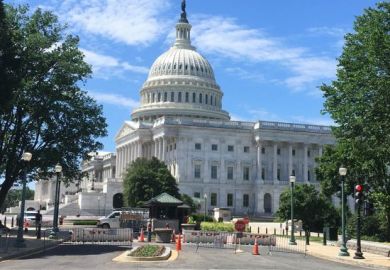Joe Biden and US congressional leaders have agreed on the outlines of a $1.75 trillion (£1.3 trillion) social spending bill that will boost student aid and minority-serving institutions while emphasising free preschool over community colleges.
The plan also promises funding to raise college completion rates, improve worker training and ease immigration backlogs. But under heavy conservative opposition, it fell short of Mr Biden’s campaign promises to double the Pell Grant and make two-year institutions effectively tuition-free.
The pact was widely regarded as ending months of negotiations on Capitol Hill over Mr Biden’s calls for a major new economic stimulus measure, though final details and positions among key lawmakers were not considered fully settled.
US higher education leaders expressed gratitude for the progress, given that Democrats holding slim majorities in both the House and Senate got virtually no cooperation from their Republican counterparts. They also voiced disappointment, as two conservative Senate Democrats largely forced Mr Biden to cut his original $3.5 trillion proposal by half, limiting his options for education and other administration priorities.
“What has been outlined so far,” said Ted Mitchell, president of the American Council on Education, the main US higher education association, “does not rise to the level of transformative change proposed by the president across a range of social initiatives, including to dramatically address existing inequities in higher education.”
The two main associations representing community colleges, despite their disappointment over the loss of the free-college plan, joined other higher education sectors in urging Congress to approve the plan.
The Biden administration’s free-college proposal would have spent $45 billion over five years to cover the difference between the cost of community college and the aid already available to students, including the Pell Grant, the main federal subsidy for low-income students. The states together would have been expected to eventually assume about a quarter of the gap-filling amount paid at the federal level.
The budget agreement outlined by Mr Biden will spend about $40 billion to increase the value of Pell grants and aid minority-serving colleges and universities. Needy students currently can get Pell grants worth up to $6,495 a year, and the agreement would raise that by $550, make the grant money count as tax-free, and extend eligibility to undocumented students who were brought to the US as children.
It’s “a meaningful expansion”, said Dr Mitchell, a former president of Occidental College and US undersecretary of education in the Obama administration. “However, the impact will be nothing like the effect that the administration intended with its proposal for a $1,475 increase – which itself is far from the president’s promise to ultimately double the maximum Pell Grant to $13,000.”
The budget agreement also explicitly makes for-profit college students ineligible for the $550 Pell increase, prompting that sector’s lobby group to call for the bill to be rejected.
In a demonstration of commitment to the negotiations, Mr Biden visited Capitol Hill just before travelling to Europe for the Group of 20 summit in Rome. Describing the agreement back at the White House – with his wife, Jill, a community college professor, standing nearby – the president said the pact will “finally take us from 12 years to 14 years of universal education in America”.
But instead of those two additional years coming in college, as he promised in the 2020 presidential campaign, Mr Biden made clear he was referencing the agreement’s inclusion of $400 billion for childcare and free preschool at ages three and four.
Register to continue
Why register?
- Registration is free and only takes a moment
- Once registered, you can read 3 articles a month
- Sign up for our newsletter
Subscribe
Or subscribe for unlimited access to:
- Unlimited access to news, views, insights & reviews
- Digital editions
- Digital access to THE’s university and college rankings analysis
Already registered or a current subscriber?








